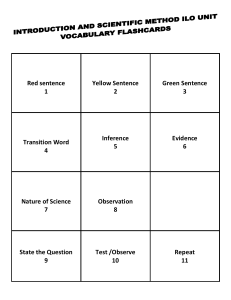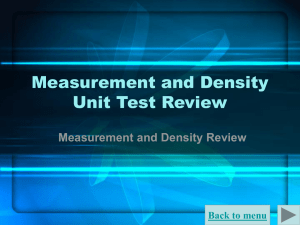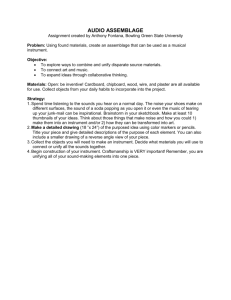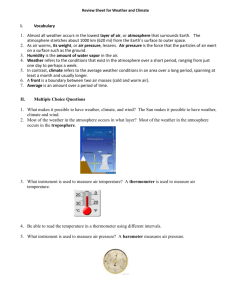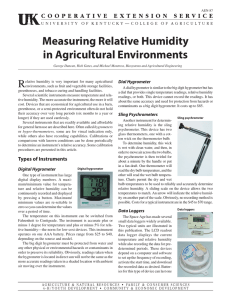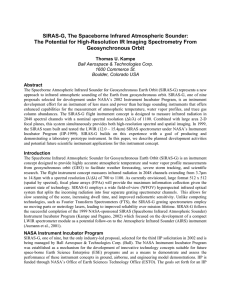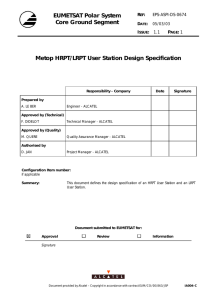Russian meteorological polar satellite Meteor-M N2: instrument performance assessment and data applications
advertisement
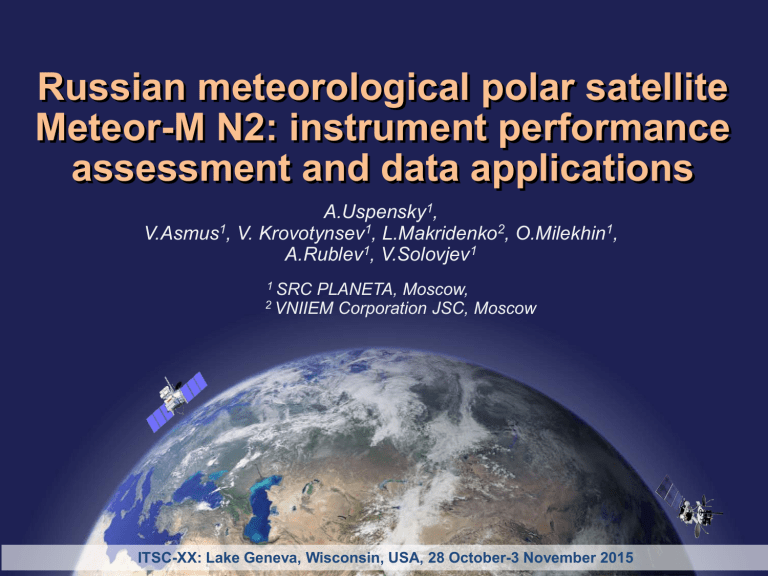
Russian meteorological polar satellite Meteor-M N2: instrument performance assessment and data applications A.Uspensky1, V.Asmus1, V. Krovotynsev1, L.Makridenko2, O.Milekhin1, A.Rublev1, V.Solovjev1 1 SRC PLANETA, Moscow, Corporation JSC, Moscow 2 VNIIEM ITSC-XX: Lake Geneva, Wisconsin, USA, 28 October-3 November 2015 1 METEOR-M General Design In-orbit mass – 2700 kg Payload mass – 1200 kg Lifetime – 5 years Orbit – Sun-synchronous Altitude – 830 km Data dissemination format – HRPT/LRPT Meteor-M №№ 2, 2-1, 2-2, 2-3, 2-4, 2-5 Basic Instruments Specifications Instrument Application Spectral band SwathStatus for Resolution width Meteor-M (km) (km) N2 MSU-MR Low-resolution multi-channel scanning unit Global and regional cloud cover mapping, ice and snow cover observation, forest fire monitoring… KMSS Visible spectrum scanning imager Earth surface monitoring for various tasks (floods, soil and vegetation cover state, ice cover) 0,4-0,9 µm 450/900 (3+3 channels) 0,05/0,1 MTVZA-GY Imager-sounder (module for temperature and humidity sounding of the atmosphere) Atmospheric temperature and humidity profiles, sea surface wind 10,6-183,3 GHz (26 channels) 2600 12 – 75 Functional IRFS-2 Advanced IR sounder (infrared Fourier-spectrometer) Atmospheric temperature and humidity profiles 5-15 µm 2000 35 Functional “Severjanin-M” Synthetic aperture radar All-weather Ice coverage monitoring 9500-9700 MHz 600 0,4 x 0,5 Limited GGAK-M Heliogeophysical instrument suite Heliogeophysical data providing Functional BRK SSPD Data Collection System Data retransmission from DCP Limited 0,5 – 12,5µm (6 channels) 3000 1x1 Functional Functional 2 Post-launch characterisation of Meteor-M N2 instruments 1. MSU-MR: operational. On-orbit radiometric calibration accuracy, NEΔT meet specifications. Cal/val procedures have been performed using comparisons with SEVIRI/Meteosat-10 and RTTOV simulations. Data is available to direct broadcast users in HRPT format. 2. KMSS: operational within design specifications. Instrument is working in on-demand mode. 3. MTVZA-GY: operational. Calibration coefficients from TDR to SDR were updated, but the process is ongoing. Biases between measurements and simulations are airmass dependent. The data will be provided to EUMETSAT for evaluation and further distribution to user community. 4. IRFS-2: operational. Instrument performance was assessed by comparisons with IASI/Metop, LBLRTM simulations. With the regular cal/val procedures, the data can be used for remote atmospheric sounding applications. 5. SAR “Severjanin-M”: limited functionality. Operated in on-demand mode. The data from this instrument is affected by the low signal/noise ratio, but can be used in some applications. Thank you!
